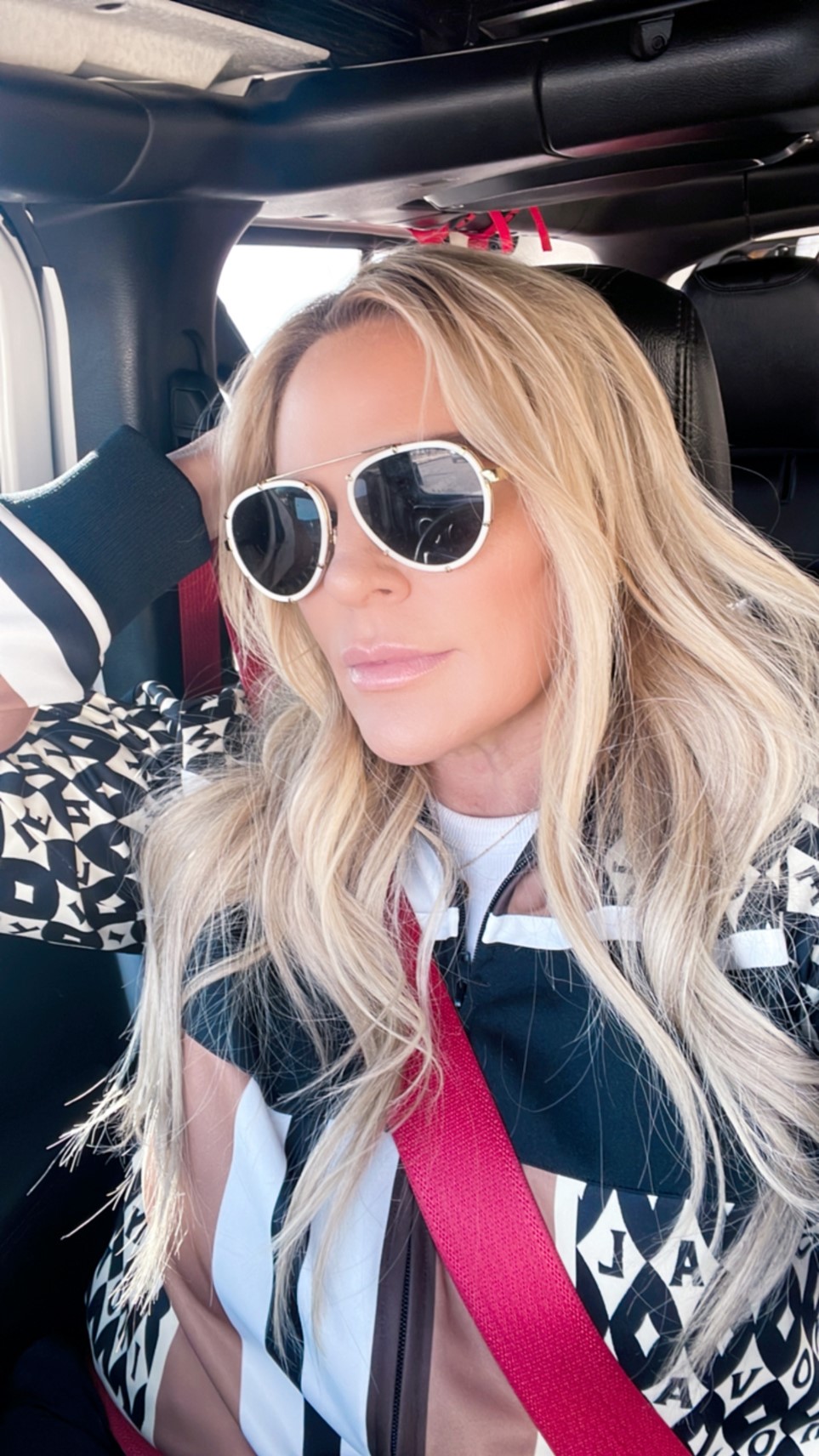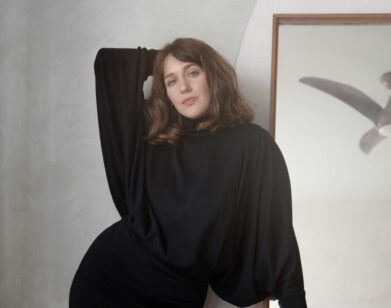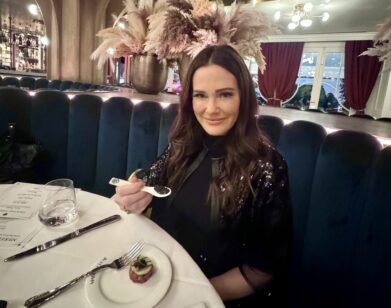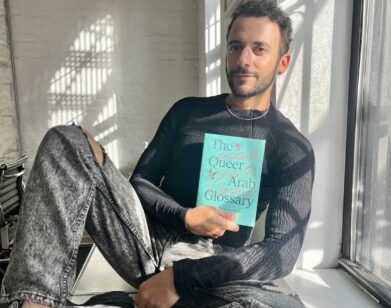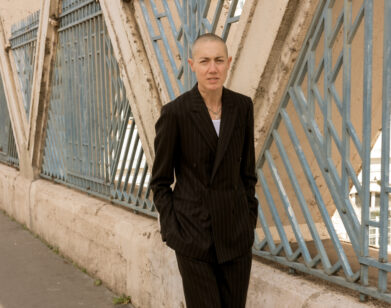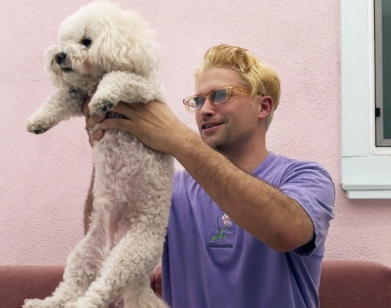TELL-ALL
Real Housewife Heather Gay on Jen Shah, Black Eyes, and Writing a Memoir
Heather Gay was initially opposed to the title Bad Mormon. On Bravo’s Real Housewives of Salt Lake City, the Beauty Lab + Laser mogul has successfully carved a space amongst the cast as its resident party girl. From the first episode, she’s been open about her proudly “Mormon-ish” ways: she drinks alcohol, listens to rap music, and is friends with gay people. But when it came time to settle on a title for her new memoir, which chronicles her gradual disillusionment with the Mormon faith, starting with her devout childhood and ending with her current station as a Housewife, Gay was terrified of how provocative the phrase would be to friends and family, many whom are still closely involved with the church. Eventually, she had to admit that it was perfect: Gay’s book is raw and revealing, an eye-opening firsthand account of religious indoctrination told with candor and sincerity. It’s a personal story, for sure, but one that requires breaking more than a few Mormon rules to make its point.
It’s all worth it for Gay, who views the book as the official account of her metamorphosis into the strong, successful, independent woman she is today. A couple weeks before its release, she hops on Zoom in especially high spirits. Fresh off her toughest season of RHOSLC—and its equally draining reunion—Gay still can’t find reason to complain. “I’m like a strong six or seven,” she says of her current “happiness level.” (And that could possibly go up if the memoir sells well, she adds.) Over a virtual chat, Gay opened up about her embattled castmate Jen Shah, the enduring mystery of her black eye, and why her book is more “salacious” than other Mormon tell-alls like Under the Banner of Heaven.
———
MICHAEL CUBY: You’re here to talk about your book. Was there any point in your life where you thought that you were going to be sitting down to discuss a memoir that you yourself wrote?
HEATHER GAY: No. This was far out of the realm of any sort of possibility. This is a total dream come true and feels surreal, still. I mean, to hold a book with my face on it… none of my life feels real in the last three years. I’ve literally been living it on reality television and it feels like a parody of itself.
CUBY: Speaking of reality TV, there’s this scene this season where you’re shooting the cover for your book, but you don’t have the book yet, and obviously all your castmates are making jokes about the book not being there. What do you have to say to all of them now that it exists?
GAY: Just what they wanted, another book to read. I don’t know if they’re big readers, but they are all in the book, so they might want to give it a quick perusal. They’ve read the chapters about themselves, so hopefully there’s not a lot of surprises.
CUBY: Why write a book?
GAY: I really feel like I’m changing so much about my life, so much about our history, so much about my family line. My ancestors were oxcart pioneers. Everyone has remained true to the faith, has perpetuated the culture and this Mormon lineage. So if I were to leave and upend all of that, I wanted to make sure that I left no stone unturned and that this was really my story, my experience, told from my perspective. I felt like it was important that I wrote it all down in a concrete way, that it would far outlast the legacy of just me leaving the church.
CUBY: Can you walk me through the process of sitting down and deciding to write this book?
GAY: I’ve always kind of steamed myself to be a writer, but I had no idea how to tell my story. I didn’t even know the vocabulary to use to explain the process, so I really tried to just talk about becoming a housewife. Growing up, I felt my entire world was informed by this universal concept of Mormonism. Then, over the course of the years, it slowly began to erode. When I finally wrote the book, I started just with big concrete memories. What do I remember about my baptism? My first realization that we were different? It really flowed out of me. The most difficult parts to write were the temple rituals, because I had been taught to never speak of those, let alone describe them or expose them to the world. It was also difficult to write about my separation and divorce because it was such a dark time for me that a lot of those memories were kind of painful and cloudy.
CUBY: There’s this line that stood out to me. You say, “As soon as I became a Real Housewife, I became a bad Mormon.” Now, you’re exposing even more about the faith through a book. The book has not come out just yet, but are you scared about what the response is going to be?
GAY: I’m already starting to see the fallout with my closest friends. It’s one thing to be on the show. There’s some novelty and fun in that, but it was also a huge departure from the way we live our life. Writing the book feels like a second step, like you said. It feels like now there’s no going back. I changed all of my close friend’s names. They have told me they’re not going to read it. That is sad and painful, to know that the people who formed your entire life don’t want to read about your perspective on it just because you no longer follow the same code of beliefs. I knew there’d be fallout, but I think you’re right, the fallout is yet to come and I’m terrified, of course.
CUBY: Well, the title definitely lays it all out there. Tell me about how you came up with it.
GAY: The title was from this musician Dylan, who runs the Instagram RHONY Musical. When season one came out, they wrote a little musical called “Bad Mormon.” It was so funny and so poignant and I just thought they nailed it. Then when my agent approached me about doing the book, he’s like, I think that it’s got to be called “Bad Mormon.” I said, “Absolutely not, I will never put my face with the word ‘bad’ and ‘Mormon’ in the same sentence. I would never dishonor my family and my ancestry, blah, blah, blah.” But this has been a process for me. It’s been like peeling back layers of an onion. And a lot of things happened in my life that made me realize more and more how perfect that title was.
CUBY: You go into detail about your marriage and divorce and how hard that period of your life was. When you were in the throes of it, were you able to see the light at the end of the tunnel?
GAY: Honey, no. It was so dark. I was just living an unlived life. I look around now and I can’t believe it. It feels like a fever dream. I mean, I was absolutely dead inside. They asked me when I started the show, “what’s your happiness level, 0 to 10?” I said, “about a zero or a one.” You can have a successful business, you can have friends, you can have healthy children, but when you feel like your life’s purpose has been demolished, it’s really hard to find self-worth and value in what you’re doing every day, especially for me as a mom.
CUBY: What’s your happiness level today?
GAY: I’m like a strong six or seven. Let’s see how the book sells. It might ratchet it up a little bit.
CUBY: Have you talked to your ex-husband about the book?
GAY: He referenced it when I first announced it, but we have not discussed it. It’s the elephant in the room. We don’t really interact much. He sees the kids about once a week and I’m sure he’ll read it because he’s in it, but I don’t know how he’s going to feel about it. Probably not great.
CUBY: In the book, you talk a lot about the ways that joining Housewives helped you come to terms with leaving the Church. Where do you think you’d be if you had never agreed to do the show?
GAY: Sadly, I think that I would still have one paw on the treadmill, just going through the motions, living a secret, private, hypocritical life behind the scenes, but probably participating in the community. Not believing or giving my money to the church, but making sure my kids weren’t left out and they were still involved in the community attending the social activities. Being on Housewives really just pushed me off the edge. It was like I had my feet on the edge of the diving board, just looking down at this abyss and saying, “I’m not ready to jump.” I’m so grateful for it because it took something that big to force me to face the consequences of leaving such a tight-knit community.
CUBY: You were asked by Andy Cohen at the end of season one how it felt to be a fan-favorite. You’ve just finished season three. How has your relationship with the fandom evolved over the three seasons?
GAY: Obviously, in season three, I did not get through unscathed. I felt the slings and arrows. That’s the sport of Housewives. The temperature of it is changing, I think, and it’s becoming a little bit more of a cancel culture and a little bit more severe. But even if I have bad seasons or I have haters, it doesn’t take away what Housewives has done for me and the way it’s changed me. All of it is incredibly validating in ways that I never imagined. If I have up seasons or down seasons, I welcome it because I’m comfortable with conditional love. As a Housewives fan, I’ve thrown popcorn at the screen before, too. I mean, I get it. It’s just such a tiny part of the experience that I would never begrudge a hard season. No one gets through unscathed.
CUBY: Obviously, this season you’ve had some strained relationships with people you’ve been friends with for a very long time. But to hear you be so optimistic, I wonder if you feel things will come back together.
GAY: Honestly, it is what it is. My relationships were real and they suffered real damage on the show. There’s no question about that. I don’t really know where to go from here in terms of my relationship with Whitney and my relationship with Jen. It’s more than a lot of Housewives deal with in their first two, three seasons. I don’t know what’s going to happen with those relationships. I don’t feel hopeful, but I’m still here, and I guess I’m pretty comfortable living in the gray now, which I used to not be.
CUBY: I have to ask. What really happened to your eye?
GAY: Let’s talk about the black eye.
CUBY: Let’s talk about the eye.
HEATHER GAY: The black eye is one of those Housewives anomalies that did not play out well on television. I got drunk and woke up with a black eye. We’ll kind of get into it at the reunion, but the truth is, I woke up on reality television with a giant massive black eye. Not face down in a cactus or anywhere that it could be explainable. I think my biggest mistake was not going to bed early that night. Then I woke up with a black eye while filming and tried to cover it up and act like we could figure it out eventually. There was a lot going on behind the scenes that was hard to make sense of without breaking the fourth wall, especially when it happened a year ago and we had to keep mum about it for this long. It’s a black mark, and a black eye, on Housewives in general. But I don’t know how to make sense of it for the viewer without ruining the magic of reality television. We don’t control the edit and we can’t really make sense of everything. I woke up with a black eye and I couldn’t explain it, but I was told there was footage that could, so I played coy because I didn’t know what was going to be presented to me.
CUBY: Right.
GAY: I didn’t want to condemn someone or say they’re innocent if there was footage to contradict that. I know the viewers will see through everything so I just played coy because I hoped that it would resolve itself. And hopefully it will.
CUBY: Is there going to be some resolution from the reunion?
GAY: I hope so, because I’m the one in the middle of it. Please, Bravo gods, resolve this. Resolve it quickly because I’m the one that woke up with the black eye and now I’m the one that’s responsible for explaining it.
CUBY: How did you feel about Jen not being there, particularly knowing this is her last season?
HEATHER GAY: The reunion was tough to film without her because she was really the one that had the most to answer for. So it put the burden on the people that had defended her rather than on her, the person that committed all these things. When she pled guilty, everything really changed. It was no longer us supporting a friend and castmate that was pleading her innocence over and over and over. It just became a chance for us to say, “Okay, well, make it right and make sure you pay back all these victims because the facts around the case are horrific and heartbreaking.” I just hope that the victims get restitution because she stole from a lot of people. It was all a lie, it was all a fraud, and we all fell for it. With the book, I was tempted to rewrite history and make myself look smarter or less impressed or less naive, but the truth was I was swept up into this life, and I was dazzled by the fraud that she was perpetuating. It’s embarrassing to realize how easily I was duped, but it’s comforting to know that so was a lot of America.
CUBY: Like you said, Real Housewives changed your life for the better in so many ways. Not that Bravo would have any reason to get rid of you, and I would be very sad if they did, but knowing how important this is to you, what would you do if you were not asked to return?
GAY: Well, that’s kind of how I end the book. Every season it’s like, “Will I get asked back?” If I never do another show again in my life, I’ll be fine. I’ll be great. I might even be better, because I need to figure out who I am and what I’m going to do moving forward. This book is really my way of just setting myself apart and holding myself accountable to the life I want to live, and the life I want to live for my daughters. My business is thriving. I’m really enjoying this second chapter. If it doesn’t include Housewives, what Housewives did for me can never be taken away. So I’ll just bid it farewell and hope for a spinoff.
CUBY: Totally. I love how much you talk about your love for Tom Hanks in this book. What is your favorite Tom Hanks role?
GAY: Cast Away, a hundred million percent. Not only for the before and after weight loss, but for the Wilson of it all, the fire, the acting. Who knew Tom Hanks could be that ripped and that blonde with that curly beard? I also love him in Big. I think he was so great in Big, to personify a 13-year-old boy because in so many ways now I feel like an adult that has this teenage adolescent perspective because I’m kind of discovering this new chapter of my life. Those would be my two.
CUBY: Have you seen Under the Banner of Heaven?
GAY: I have, yes. Of course. This is my backyard, so this is the material I want to watch.
CUBY: What did you think?
GAY: Well, there were a lot of goosebump moments. Where you’re watching it and it’s exactly the life that you live, they speak the way that your neighbors speak, they speak the way your parents speak. Everyone thought Andrew Garfield was doing this caricature and the true Mormons were like, “Nope, that’s right on the money.” That’s exactly how it is. That’s exactly how judgmental we are. This is exactly how we treat women. But to be fair, Under the Banner of Heaven didn’t even give as many salacious details as I do.
CUBY: I would agree.
GAY: The actors weren’t Mormons. Whereas this is an insider’s view. They were putting on what they read about. But you are walking through the temple with me.
CUBY: That kind of gets at my last question. What do you want readers to take away from your experience?
GAY: I really hope that people will feel seen, and that it’s representation for the marginalized, privileged few that feel like living their authentic selves causes conflict for those they love. It’s for the bad Catholic, the bad Jew, the bad Mormon, the bad Greek, anyone that’s had to disappoint their family in order to pursue their dreams, anyone that’s had to break their grandparents apart because they were who they were. I hope that they feel seen and that they laugh. I hope they enjoy the pop culture easter eggs, the Housewives references. The behind the scenes of what it takes to be a landlocked single mom and get cast on a billion-dollar franchise.
CUBY: Well, I will say I loved it. I laughed, I cried.
GAY: Thank you. That’s the best review I could have gotten. Do you kind of feel like you’re an honorary Mormon now?
CUBY: Maybe. I’ve taken a peek behind the curtains that you cut with the shears.
GAY: Let’s get you your snowflake. You’re an honorary housewife.

